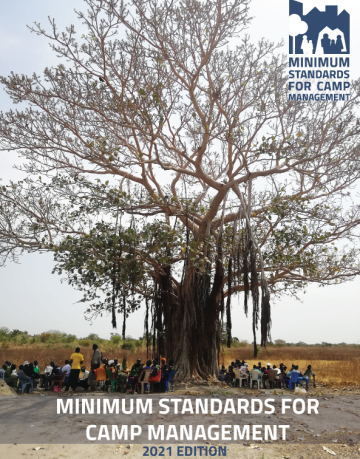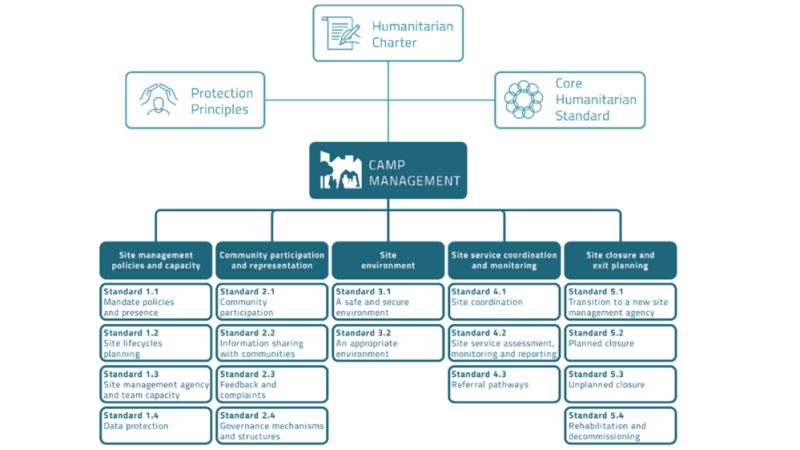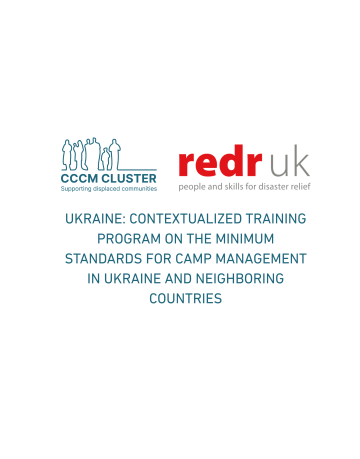Who we are
The Minimum Standards for Camp Management (MSCM) describes the minimum actions needed to support meaningful engagement within a site as well as planning and coordination between sectors and agencies. They aim to clarify the role of any site management agency working daily in humanitarian settings and to set out minimum levels of quality for that work.
Although called the Minimum Standards for Camp Management, the guidance can be applied to all contexts where displaced people seek shelter, protection, and other support. The term “site” is used unless a specific camp context is meant. Following the launch of the Minimum Standards in Camp Management handbook in 2021, the CCCM Cluster working group supported the use and application of the Standards globally.
What we do
The Global CCCM Cluster has a Camp Management Standards Working Group responsible for directing global efforts related to the Minimum Standards. The Working Group was responsible for the drafting, piloting, and testing of the standards. It currently works on the following:
Translations are now available in Arabic, Bangla, Dari, English, Indonesian, Korean, Pashtu, Polish, Portuguese, Spanish, Turkish, and Ukrainian, supporting teams to uphold rights in a diversity of displacement settings.
Coordination of the standards at a global level, including its representation in coordination forums.
Translation of the standards.
Upkeep of the standards.
Aiding country clusters and organisations in the take up of the standards.
Managing the standards relationship with the Humanitarian Standards Partnership.
The Humanitarian Standards Partnership Network
Minimum Standards for Camp Management has been a member of the Humanitarian Standards Partnership network since 2021. The membership forum brings together several key humanitarian organizations to promote coherent, coordinated, and accountable responses during humanitarian crises by harmonizing and disseminating humanitarian standards.
The HSP’s mission is to ensure that field practitioners have access to a set of harmonized, user-friendly, and widely endorsed humanitarian standards. These standards guide humanitarian actors on what quality and accountable assistance should look like across different sectors.
Working together, the handbooks:
- Promotes consistency across sectors and organizations
- Facilitates inter-agency coordination
- Enhances accountability to affected populations
- Strengthens capacity building and training efforts
CCCM Cluster is proud to be an active member in this group.
Established in 2015, the HSP is led by Sphere and includes:
- Sphere (Minimum Standards for Humanitarian Response)
- CCCM Cluster (Camp Coordination and Camp Management)
- CHS Alliance (Core Humanitarian Standard)
- INEE (Education in Emergencies)
- LEGS (Livestock Emergency Guidelines and Standards)
- WASH Cluster (via the WASH standards in Sphere)
- Child Protection Minimum Standards (CPMS)
- Minimum Economic Recovery Standards (MERS)

The Minimum Standards in Camp Management, championed by the CCCM Cluster - serve as a roadmap for accountability. They place the participation of affected populations at the center, ensuring that humanitarian actors are answerable to the communities they serve.
Designed to follow the same structure as other humanitarian standards handbooks like Sphere, the MSCM include minimum standards, key actions, key indicators, and guidance for all aspects of management of sites, including:
- Site management policies and capacities
- Community participation and representation
- Site environment
- Site service coordination and monitoring
- Exit and transition
Online self-paced training
There is also a self-paced online training titled an "Introduction to the Minimum Standards for Camp Management (MSCM)" link here: https://kayaconnect.org/course/info.php?id=11889
Each minimum standard is accompanied by key actions, key indicators, and guidance notes to achieve them:
The Standards are universal and derived from the rights of all displaced people, and apply universally in all contexts.
The key actions outline practical steps to achieve the minimum standard. The practitioner should select the most relevant to the situation.
Indicators measure whether the standard is being reached. They provide a way to capture progress and measure program results against the standard over the life of the response. Minimum quantitative requirements are the lowest acceptable level of achievement and should be contextualized.
Guidance notes are included as additional information to support key actions, with cross-references to other guidance including the Camp Management Toolkit and Sphere.


RedR UK and CCCM Cluster published a case study on how a contextualized training program based on the Minimum Standards for Camp Management in Ukraine and neighbouring countries was established.
The training focused on strengthening local knowledge and aligning responses with humanitarian principles and sector standards. It targeted individuals from local organizations, municipalities, community-based groups, and faith-based organizations involved in managing displacement sites.
The initiative, delivered between May 2022 and February 2023, equipped local staff and volunteers with the necessary skills to manage displacement sites effectively amidst the challenges posed by the ongoing conflict.

